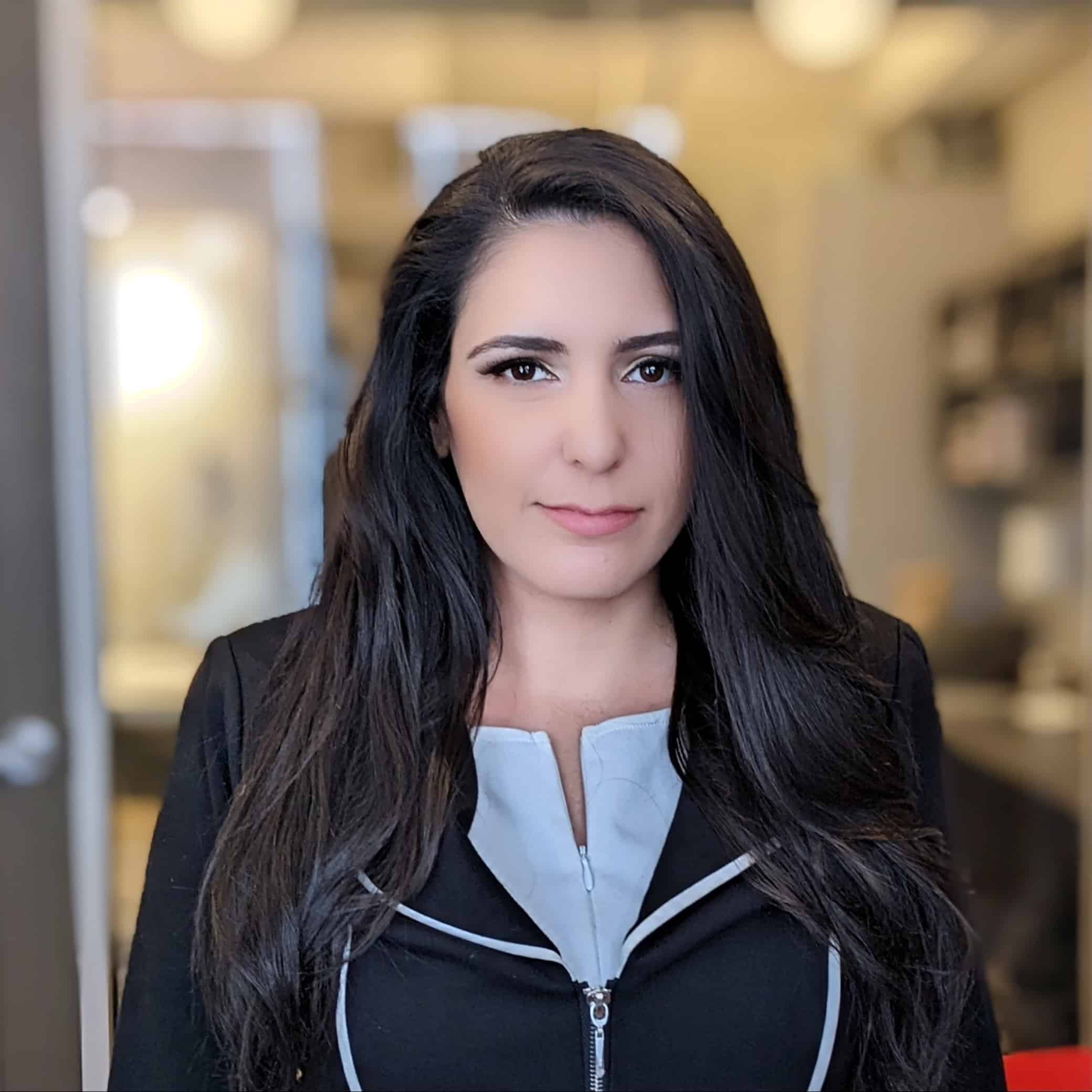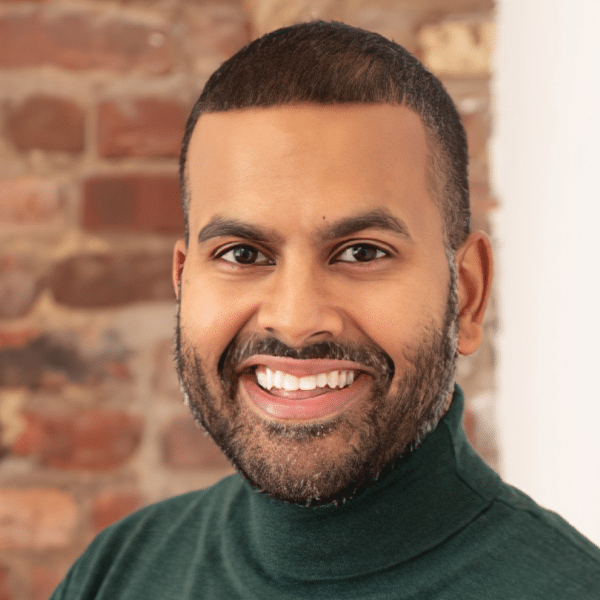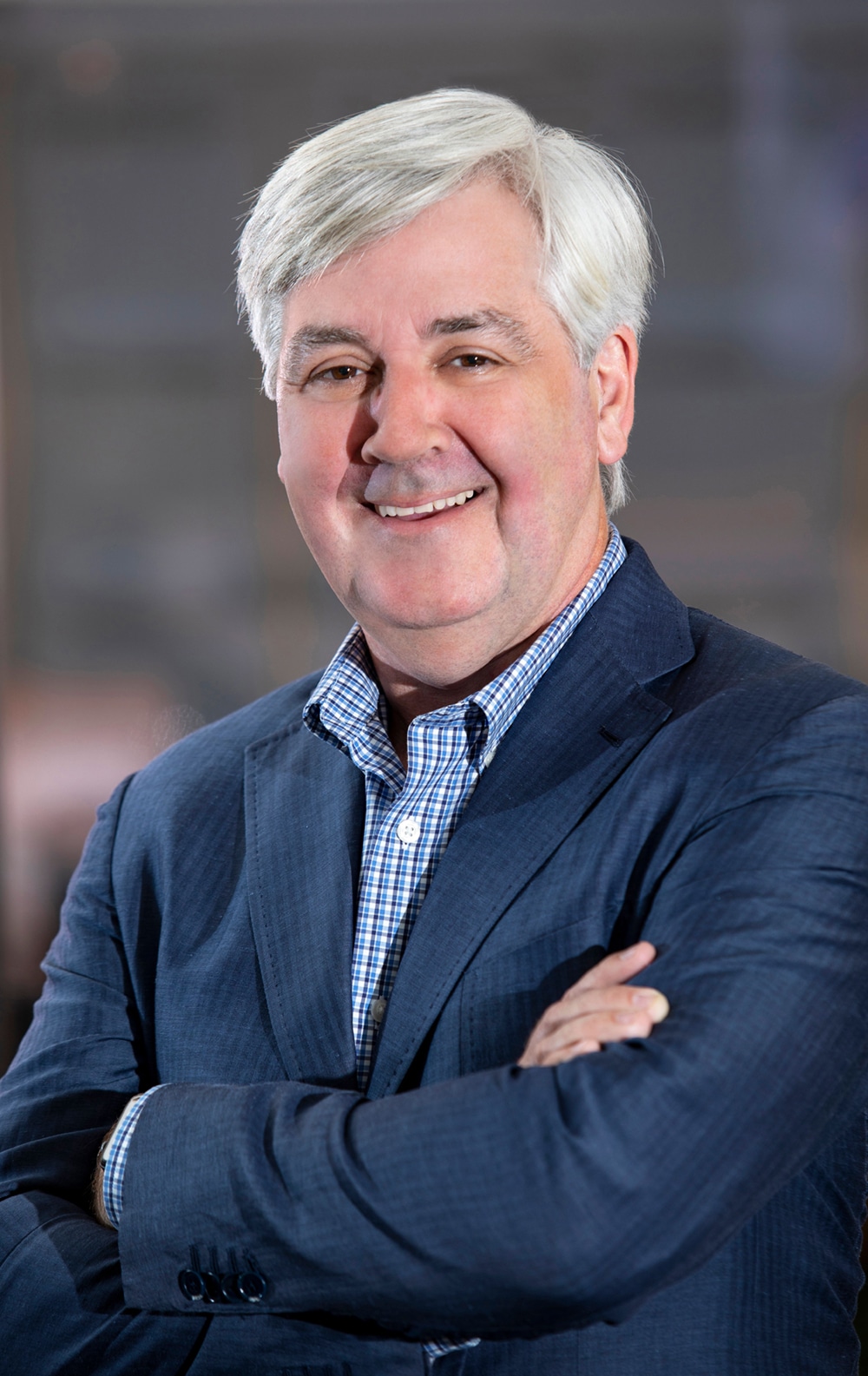How Marketers Can Lean Into AI
Tom Madrilejos
Associate Director of Audience Strategy at Mod Op

Explore the landscape of AI adoption, ranging from novices to experts. Gain insights into the common concerns plaguing colleagues and clients, including plagiarism, data leaks, IP issues and the sustainability of AI in content marketing and SEO.
“I think AI is going to usher in the next wave of exceptional and innovative work.”
Uncover key pillars of successful AI integration in marketing: transparency, communication and risk management. Discover how to drive innovation within your organization by establishing an AI Council complete with cross-functional teams.
Don’t miss this engaging conversation that sheds light on the future of marketing with AI. Stay tuned for upcoming episodes covering AI, marketing channels, measurement, risk management and more.
Leader Generation is hosted by Tessa Burg and brought to you by Mod Op.
Highlights From This Episode:
- AI and machine learning in marketing
- Concerns about AI adoption
- Challenges and opportunities
- Transparency and risk management
- Legal and governance considerations
- Compliance and data protection
- AI councils and cross-functional teams
Watch the Live Recording
Tessa Burg: Hello, and welcome to another episode of Leader Generation, brought to you by Mod Op. I’m your host, Tessa Burg, and today joining me is Thomas Madrilejos. Thanks for joining us, Tom.
Tom Madrilejos: Well, hello, glad to be here again.
Tessa Burg: Yes, I know. So it’s crazy but we started this podcast five years ago and the original purpose was, you know, during the pandemic we wanted to make sure our clients were looped in to how their marketing and communication plans had to evolve to the very changing landscape of where people worked and how they bought and sold products and services. And it’s nuts that we’re here now, and this will be Tom’s second time on the podcast and the first time we were in such a different place. But Tom, thank you so much for joining us again. And let’s start with, give us a little bit about your background and what have you been up to the last five years?
Tom Madrilejos: Oh man yeah, five years goes quick. Yeah, so as you said, yeah, I’m Tom Madrilejos, I’m the associate Director of Audience Strategy, which means I lead, alongside our client teams, the development of digital marketing and go to market strategies for clients here at Mod Op. So that’s essentially looking at everything across digital and offline and anything that we can use to help execute against client goals.
Tessa Burg: I love it. And the original title of this podcast used to be RapidTesting.ai, where we talked about, you know, how can you maximize the use of marketing tools to get results faster and better? And now we’re going to talk about AI and machine learning, but really for the exact same reasons. And a lot of the things that we’re testing and doing at Mod Op right now are to answer that question, how do we get better results? How do we get them faster? And how do we produce higher quality work, but in a way that differentiates us? What I’m curious about Tom, is, you know, we’ve been doing a lot here, what excites you most about AI and machine learning?
Tom Madrilejos: That’s a huge question, there’s so much. I think one of the big things that I’m really excited about is that it’s kind of going to be the new equalizer, I think, in marketing and communication. So it’s empowering and giving a lot of people immediately the ability to do good enough work. So like the bar of what’s acceptable is now widely immediately available to anyone who can interact with the chat bot. So I think that’s a great thing, it’s going to help a lot of people. And that actually leads into the other thing that I’m excited about, which is kind of, I think it’s going to usher in the next wave of exceptional or innovative because people are going to, not everyone’s going to be satisfied with good enough. I don’t think people ever are. And so everyone’s going to be using these tools to get even better. And that’s actually what I’m really excited to see.
Tessa Burg: And I know that, you know, you’re in audience strategy and you have a ton of experience using digital marketing tools across the spectrum, whether it’s display, websites, landing pages, emails, paid search, organic search, paid social, organic search. Like you have so many tools in your toolbox. So when you’re putting together strategies for clients, what are you hearing from them in regards to either their level of understanding or their level of excitement of AI/machine learning?
Tom Madrilejos: Oh, that’s another one, it’s kind of across the board. There’s, not really just one answer. There’s everyone’s kind of reacting in their own way. Some of the conversations I think are good educational moments. So kind of, you know, working with the client and colleagues to say, you know, there are AI/machine learning tools that you’ve been using in the background for the past, you know, five, six years helping to optimize your paid campaigns so it’s not completely foreign. So I think that helps get them comfortable, but there is a lot of concern, and across the board, so like people worried about plagiarism on one end, like using something that you’re not supposed to use. And on the other side, having their material be part of training data and be, you know, potentially infringed upon. People are worried about the quality of what people are getting out of tools like ChatGPT, so the hallucinations that might come out of it and be used improperly if people aren’t, you know, maintaining an eye on detail. We’ve seen brand side, you know, data leaks, IP leaks, everyone knows the Samsung episode, but I’m sure there’s way more of people exposing data that they’re not supposed to. So there’s a lot of concerns, worries about the risks, even in particular, like very specifically with things like content and SEO where people are, even if they’re open to using AI-generated content for their website to, you know, help with their search rankings, they’re thinking forward and saying, is this sustainable? Like, is Google going to crack down on this in three months and I’m going to lose all my site traffic? So there’s people who are ready to use it and they’re ready to say, how can this help me today? How can it increase performance on whatever my marketing efforts are? But there’s a lot of risk. So I think that’s where everyone’s mind is at, especially on the brand side, is that risk management.
Tessa Burg: Yeah and those definitely sound like all very valid concerns. And I feel like anytime a new tool or a new channel comes out, there is a tendency on the client and the brand side, and even, you know, both of us have been on the client side to be concerned about your customers, your own internal IP, if it’s going to get out, and what is your brand sitting next to out in the marketplace. Like, if you don’t understand AI and machine learning or how it’s working or how it’s gonna help, then how could you get excited about using it?
Tom Madrilejos: Right. There’s so much and I think that everyone’s kind of dealing with, there’s a lot of unknowns and that’s fair because it’s all happening so quickly. So I think, you know, we’re trying to stay on top of our client’s mindset and try to help assure them as we’re also staying on top of all the newest news. I mean, even with stuff like the custom GPTs, within 24 hours of those being publicly launched, there were dozens and dozens of amazing applications. So it’s within hours that people are utilizing these things for new things. And so I think trying to kind of stay with our clients and help them as it’s all kind of happening and I think that’s what we’re here for.
Tessa Burg: Yeah, I agree. And I think, you know, at Mod Op we’re taking the position of, we’re leaning into the use of machine learning and AI and we do sit in unique position, having data scientists, having people who are doing deep research in machine learning and AI as well as people who have spent their entire career in data management and security and compliance, you know, at our company. And even if you’re on the client or brand side, you have those people at your company, it’s a matter of creating a group or a program that goes across those silos. And that is what’s required for marketers and our client side colleagues to really lean in themselves. We recommend creating an AI Council and really embracing, testing different applications, seeing what works. But before you start, something you said earlier, Tom, is so true and so important, recognize that a lot of the platforms you have today, Salesforce, what you’re using for marketing, you know, HubSpot, AdWords has had, you know, AI in it, I think since it was invented. I mean it’s really Google’s entire reason for existing is to get all the data and to continuously learn. But you know, Meta has always had AI machine learning built into it, programmatic. So the best place to start, like if you’re a marketer sitting here right now saying, my company is concerned, they’re not leaning in. My company understands the risks and those risks are blocking them, or definitely holding us back from doing more with AI and ML, what can I do? And I would say first baseline your tech stack. Start with the marketing tech stack, but then look across the entire organization and start to create those relationships and bridges. And then the second step would be is to find an executive sponsor. There is no question that AI and machine learning will increase efficiency, can drive revenue, will drive revenue. If you think about if you’re an e-commerce company, just increasing your conversion rates. And it can also differentiate, I totally agree Tom that there will be an opportunity for companies and people who are not developers to create and innovate in ways they never have before. And just by building those bridges and knowing where you’re at today and aligning that to your objectives can really help start to form what, you know, it might become an AI Council or you might call that group something else. Our good friend Chris Penn who sent me that video calls it the AI pilot team. And that’s where I would challenge everyone listening, especially if you’re on the client side and you haven’t really started enterprise programs that leverage AI and ML, is don’t wait because you will be left behind.
Tom Madrilejos: I kind of want to hit that first thing you said again, which is when you’re getting your baseline. I think when you start to talk to all your practitioner teams, you’re gonna realize that a lot of platforms, like you said in marketing today, have had an AI component or quickly adopted one in 2023. And so I think they’re going to be able to give you a lot of great on the ground feedback because they’ve already been, let’s say for example, they’ve been testing Google Performance Max for the past year, and they can tell you when they think it’s appropriate to use when they don’t think it’s appropriate to use. And I think that really helps set the stage and give brands like a comfortable baseline to start thinking about how these tools fit in other areas. So when they understand how it works in one area that they’re familiar with, it can kind of branch into others. I think that’s a great point.
Tessa Burg: Yeah, and I think comfort is really important. I mean that is the key to unlocking the power of any tool, but especially AI and ML, like these concerns are valid. There are risks in all of these platforms, whether they’re existing with you today or whether you’re looking at them tomorrow. And I would encourage, you know, in-house client marketers to baseline where their internal teams are at today and create feedback loops. So ask people, how excited are you, you know, we started this conversation with how excited is Tom about AI and ML? Ask the people at your company how excited are they? You know, quantify that, hear from them what’s holding them back, catalog those risks and concerns, and that way that will help you prioritize the type of risk management programs you put into place. But also inform your internal communication strategy, and then be prepared for when your customers might come to you and say, hey, this is awesome, I love this work, but I think a common question that’s coming up now is, did you use AI and ML to do that? And people might ask that out of curiosity and be like, oh my God, that’s so awesome. Or they might just be asking it to be like, oh my God, now that I know you used AI and ML, like, I’m not sure how I feel about the output. So I think comfort is key. Measuring progress, creating those feedback loops and having that, you know, transparency internally and externally will be very important and make change management , you know, more productive.
Tom Madrilejos: Yeah, it’s definitely going to be a collaborative process for sure. Like I think feedback loops, transparency, communication, it’s never bad things.
Tessa Burg: No, yeah.
Tom Madrilejos: I kind of want to hit on something you said about the councils or the pilot team. So like, and I know you’ve been spearheading that effort with us. What kind of, and I know you’ve detailed this in a previous podcast, so people should go check that out, but what kind of people, what kind of team members, stakeholders, you know, subject matter experts, are you seeing, you know, have the most impact on the council? Or is there specialized training needed at all? Or can anyone join? What are your thoughts there?
Tessa Burg: Yeah, I will say that the way we structured the council is we allowed people to raise their hand and say, I would be interested. And I think that we’re really lucky that so many people raised their hand and wanted to join it. I think that when I’ve talked to other colleagues where people have been voluntold or they sort of made the decision like, hey, we’re gonna create an AI Council and it’ll be these people because of their role and their position in the company or their level of seniority, that has moved slowly. And so it’s more important that the people in the AI Council, one want to lean in to AI and ML and they’re not just curious about what it can do. They’re curious as to why, why did that work? Why didn’t? Why do you have this concern? They are looking for that deeper meaning and are comfortable in the gray, especially when it comes to governance and risk. We have to vet, and that is tedious. But if you are driven by why, then doing measurement activities where you log, you know where you’re at today before you use AI, ML, and then you apply an application and you start to log what it looks like after AI, ML, that’s really important. But I think a lot of people when they just sort of want, they want to switch to flip. Like you can be curious about AI, ML, it’s not like switching a flip, it just doesn’t work. You have to want to know why it works and invest the time to better understand how you can make that tool more effective, more safe, and more accessible to people who maybe aren’t at the why yet. So, you know, we internally have broken those responsibilities out. We have a team that’s responsible for testing, team that’s responsible for responsible use and setting the standards, and they’re really looking at different perspectives from different use cases. And that helps them inform another committee, which is education, lots of training, lots of conversation, lots of feedback loops, and measurement. So if this is the benefit we plan to get out of this tool, then let’s first measure and make sure that we will be able to achieve what we want to achieve. And what’s the ROI on it? So I think when you have those types of roles, in some cases it’s important to have a technical expert, like in the measurement committee, that is in our team, it’s a data scientist, it should be someone at least with an analytics or business intelligence background. And for the rest though, it’s really any position in the company, they have to want to learn it, they have to want to invest the time themselves. And I would say making sure that whoever your executive sponsor is also has some decision making ability. ‘Cause it’s not free! You have to pay for all these licenses. So yeah, I feel like I’m missing stuff, but that, I think those are some key things about skill and where those skills can fit in to different types of roles.
Tom Madrilejos: There’s definitely a lot there, a lot of things to have an advocate, a lot of point of views to have an advocate for. And with everything, again, moving so fast, I’m sure those people are very, very busy in the council.
Tessa Burg: They are-
Tom Madrilejos: so I think all that said, where can we, if you’re a brand listening to this today, where do we start? I know, you know, we talked a lot about councils, I know we talked about base lining your current tech stack, you know, gauging comfort across your org. Where do people start tomorrow?
Tessa Burg: Yeah, so one thing that, you know, we ourselves ran into, and sometimes I think, and I know on the client and brand side I also overlooked this or took our legal department for granted, is terms and conditions. You know, when you start to look at this tech stack you have today, you’ll probably notice in the terms and conditions that they would really like to take some liberties with your data. And I know this has been, you know, all over the news and we ourselves are investing in research around safety and security. But I would, you know, talk to your internal team, your internal legal team about what do your terms and conditions need to read as you one, are already using AI and ML very likely, and two, start to introduce new tools. It becomes even more important, so that might just be simply, I’m sure legal, somebody not me, would be like, oh, those are disclosures and that sounds great. But it also becomes way more important if you decide to start creating innovation yourself, and that innovation, it’s not like we think you’re gonna create a foundational model, or maybe you’re at a big enough company and you can do that. But even if you start to take data for one application and put it in another or put it in a different environment because you want to analyze it or you want to create models, or simply start to pull out patterns, that too is use of data in a different way. I think once what we’ve seen is when you get the right people on your AI Council, a lot of awesome ideas start coming out. So in parallel, it’s really important that those ideas that you have a specific governance committee that works with your legal team to say, does this change our privacy policy, our terms and conditions, and what are we doing to always protect our customer’s identity and our customer’s data as well as our own.
Tom Madrilejos: Yeah, that makes a lot of sense. And it sounds like a job for a professional, in a professional group for sure.
Tessa Burg: Yes, yeah. Yeah just don’t get caught up in the excitement and forget about it. It’s like probably one of the most important things right now.
Tom Madrilejos: So are we going to be having a conversation with any of the legal people going forward?
Tessa Burg: Oh yeah, no, when we are, what was it like a year, two years ago? You know, we did our first large AI project with a client and definitely worked, well we worked with their legal team and you know, at right now still as CTO at Mod Op, I think it’s very important that when we’re doing projects with clients, that you’re using the client side legal team and that we are following their lead, but also that we are always the ones getting permission into their environment, not vice versa. You know, the best way to protect our clients’ data is for us not to ingest it. And as we know, the way to get the most out of AI ML is actually based on our industry expertise and use of the tools. So a lot of times innovation is not what we’ve invented, but it’s what the process is we’ve created or how we know how to configure certain platforms, to talk to other platforms. That’s really important. But it also doesn’t require us to own that platform, to own that data. So it’s a really important lane and for brands who are thinking about how they get the most out of AI, ML, you know, industry expertise, technical experts who know how to get the most out of that tool and you want to protect your data, that is a great way to do it. And then, you know, on our side, yes, we have started developing our own innovation and so we’ve engaged, or you know, did a while ago an attorney on our on for Mod Op as well. And then I think that, again, just being able to raise the consciousness, you know, when those use cases come in, but anytime you’re ingesting data, modeling data, and we’ve made sure that we’re disclosing to clients, you know, when a tool is in use. And I think it’s been really exciting. A lot of our clients are really leaning into AI, ML. So they’ve had that reaction of like, oh my God, that’s so cool and they’ve seen the results. But yeah, it’s an important step and it’s an always on program. I think that’s another piece when I’ve talked to some of my colleagues that can get missed. Governance is not something that, you know, we update our terms and conditions, we create some policies, it’s a process. That’s why it needs to be in the council for every conversation, every weekly meeting. So it’s constantly being updated, and there’s a communication plan tied to it.
Tom Madrilejos: Yeah, I think that this kind of reinforces what you said earlier about maintaining clear communication transparency as this is new territory altogether. So having that with your client, through your client to their legal team, back to our own legal team, it’s all kind of staying in clear communication. I like that a lot.
Tessa Burg: So Tom, I think we need to wrap this up, but this has given me a lot of ideas for future episodes. Like I would love to do an episode where, you know, we talk to our expert on governance and compliance. She’s amazing. We’ll bring on our data scientists again to do another episode on measurement. There’s a lot of areas that we can go deeper into and even your question earlier, like what are the impacts, and how do we manage risk in specific like channels like SEO or social or displays. So I feel like this episode is gonna give way to a lot of deeper episodes and we’ll bring on more thought leaders who have deep expertise and experience in these channels to give their opinion. But I wanna thank you today as a strategist. I love getting your perspective ’cause you see across everything. So thank you so much for being a guest today.
Tom Madrilejos: Happy to anytime.
Tessa Burg: And if you want to hear more episodes of the Leader Generation podcast, you can visit ModOp.com. That’s M-O-D-O-P.COM and you can find Tom on LinkedIn. Tom, can they find you on LinkedIn or any other handles that you use for communication?
Tom Madrilejos: Just by my name, yeah nice and easy. I guess if you’re just listening Yeah, I have a heck of a last name, but it’s Tom Madrilejos.
Tessa Burg: Yeah, M-A-D-R-I-L-E-J-O-S. It’s actually spelled the way it sounds if you speak Spanish. That’s how I remember it. And yeah, we will be back next week with more conversations on AI and machine learning and all things marketing and communications.
Tom Madrilejos
Associate Director of Audience Strategy at Mod Op

Tom has a proven track record of driving digital marketing success. With a wealth of experience, he leads alongside client teams in developing cutting-edge digital marketing and go-to-market strategies. Tom specializes in harnessing the power of AI and machine learning to optimize marketing campaigns, enhance customer engagement and achieve superior results. His passion for innovation and commitment to delivering exceptional value make him a vital asset in digital marketing.





